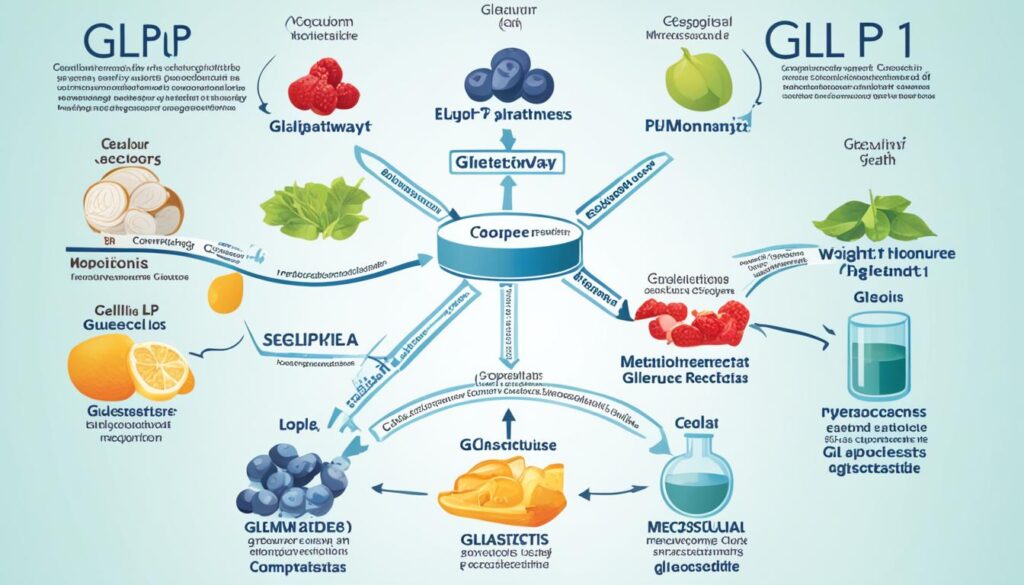Could the key to successful long-term weight loss lie not in intense diet changes or grueling workouts, but in a revolutionary new medication? Semaglutide, which received its FDA approval in June 2021, is reshaping the landscape of obesity treatment by recognizing that obesity is a complex, chronic disease, rather than solely a matter of willpower.
As the first medication approved for chronic weight management in seven years, semaglutide has already demonstrated its potential for transformative weight loss results, providing hope for the 70% of American adults classified as either obese or overweight1. Blending insight into the body’s own processes with real-world efficacy, this GLP-1 receptor agonist addresses not just weight, but also weight-related health issues, establishing a comprehensive approach to managing obesity effectively.
Key Takeaways
- Semaglutide was approved by the FDA for weight management in 2021.
- It is recognized as a significant breakthrough in treating obesity.
- The medication demonstrates an impressive ability to promote sustained weight loss.
- Semaglutide acts as a GLP-1 receptor agonist, working with the body’s natural hormones.
- The rise of obesity rates underscores the urgent need for innovative treatment options.
- Clinical studies have shown promising results in weight reduction among patients on semaglutide.
Understanding Semaglutide
Semaglutide is making waves in the fight against obesity and Type 2 diabetes. As a GLP-1 analog, it helps regulate appetite and energy balance in the body. This innovative medication mimics the natural glucagon-like peptide-1 hormone, enhancing the body’s ability to control hunger and promote feelings of fullness.
What is Semaglutide?
What is semaglutide? This medication, sold under the brand name Wegovy, has gained FDA approval for its efficacy and is primarily used in managing obesity. Semaglutide is classified as a glucagon-like peptide-1 receptor agonist, meaning it activates GLP-1 receptors in the brain to influence appetite regulation and gastric emptying2.
How Semaglutide Works in the Body
Understanding how does semaglutide work begins with its mechanism of action. By stimulating GLP-1 receptors, semaglutide increases feelings of fullness while reducing hunger, which can lead to decreased caloric intake2. Studies have shown individuals using semaglutide can lose significant weight, averaging around 15% of their body weight over about 68 weeks, while children experienced substantial reductions in BMI3.
This GLP-1 analog’s action extends to the brain’s reward systems, decreasing the attraction of high-calorie foods and promoting adherence to healthier eating patterns. Moreover, semaglutide enhances basal metabolic rates, increasing calorie expenditure even when at rest2. It promotes the breakdown of stored fat through a process called lipolysis, helping utilize fat reserves for weight loss2.
The Science Behind GLP-1 and Weight Management
The science of GLP-1 reveals its essential function in appetite regulation and weight management. This hormone, produced in the intestines, significantly regulates insulin secretion and appetite post-meal. When medications like semaglutide mimic GLP-1, they enhance these physiological processes, guiding individuals toward healthier eating habits and weight loss.
Clinical studies indicate that users of semaglutide, who incorporate lifestyle changes, experienced substantial weight loss, averaging around 33.7 pounds (15.3 kilograms), compared to a mere 5.7 pounds (2.6 kilograms) in those not on the medication4. Moreover, GLP-1 drugs generally facilitate a weight loss of approximately 10.5 to 15.8 pounds (4.8 to 7.2 kilograms) when utilizing liraglutide5. This significant difference highlights the potential effectiveness of GLP-1 analogues in combating obesity.
Research supports that semaglutide not only helps in weight management but also encourages a shift in food preferences among its users. Findings suggest that those on GLP-1 medications demonstrate a decreased desire for high-caloric foods, including dairy and starchy items4. Such alterations in appetite regulation, combined with the physiological actions of GLP-1, enable users to make more informed choices about their diet.

Furthermore, during the initial weight management phase with semaglutide, individuals often report a significant decrease in caloric intake alongside restricted eating patterns, indicating the powerful role GLP-1 plays4. Side effects may include gastric upset and nausea, particularly during the early treatment stages, although these typically resolve over time4.
Overall, the ongoing exploration into the science of GLP-1 and its implications for appetite regulation and obesity treatment continues to provide insights that may shape future weight management strategies.
The Role of Semaglutide in Obesity Treatment
Semaglutide, a groundbreaking medication for obesity treatment, significantly influences chronic weight management. This medication, which was specifically designed for individuals dealing with obesity, has reshaped the landscape of weight loss drugs. Unlike many of its predecessors, which struggled to produce substantial results, semaglutide has shown remarkable efficacy, averaging a 15% weight reduction over 68 weeks when combined with lifestyle adjustments6. This places semaglutide at the forefront of modern weight management strategies.
Semaglutide for Chronic Weight Management
The introduction of semaglutide as a treatment option has evolved its role in chronic weight management. Research from the STEP 5 trial highlights an average weight loss of 15.2% for participants using semaglutide compared to just 2.6% in the placebo group over 104 weeks7. This substantial weight loss achievement indicates the drug’s effectiveness, as 77.1% of those taking semaglutide achieved a weight loss of at least 5%, an encouraging statistic in obesity-related treatments7. It provides patients with more reliable options for managing their weight effectively, significantly impacting their overall health.
Historical Context of Weight Loss Medications
The history of weight loss drugs reveals a timeline filled with promise and disappointment. Many past medications produced marginal effects paired with serious safety issues, making their long-term usage questionable. However, semaglutide represents a refreshing advancement in this narrative, not only due to its proven efficacy but also because it addresses cardiovascular risk factors and physical functioning alongside weight loss6. As the landscape of obesity management continues to evolve, semaglutide stands out as a benchmark for future treatments.

Weight Loss with Semaglutide: Clinical Trials and Results
Clinical trials semaglutide have shown promising results in achieving remarkable weight loss success among participants. One pivotal study demonstrated that in a cohort of 175 individuals, the average weight loss achieved was 5.9% at 3 months and 10.9% at 6 months8. The majority of participants, particularly those without type 2 diabetes, experienced significant reductions in body weight, surpassing results seen in other medications9.
Key Studies Showcasing Weight Loss Success
In large trials, users of semaglutide have consistently outperformed those taking placebo, with an average weight loss of over 10% noted in several studies. For instance, the Select trial included over 17,600 participants worldwide, revealing that those on semaglutide maintained weight loss for around 65 weeks before reaching a plateau10. Importantly, 68% of users achieved at least a 5% weight reduction after two years10.
Comparing Semaglutide to Other Weight Loss Medications
When compared to other weight loss medications, semaglutide emerges as a leader due to its efficacy and safety profile. The average weight loss among semaglutide users significantly exceeded the 1.5% observed in placebo groups10. Results also indicated that 48.1% of patients lost at least 10% of their body weight, a noteworthy accomplishment compared to other available treatments9.

Administration and Dosage of Semaglutide
Semaglutide is a groundbreaking treatment for those looking to improve their health, particularly in relation to weight management and diabetes. Understanding the correct semaglutide dosage is crucial for achieving optimal results. The initial dosage for adults and children over 12 for weight management typically starts at 0.25 milligrams, administered subcutaneously once a week for the first four weeks11. This dosage may then be adjusted upward by a healthcare provider, with a ceiling of 2.4 milligrams once a week, carefully introducing the medication to minimize gastrointestinal side effects11.
For those using semaglutide as part of a broader treatment for Type 2 diabetes, the initial semaglutide administration is similarly set at 0.25 milligrams weekly, gradually increasing based on individual response and tolerability11. Proper training on how to use semaglutide is essential for patients to remain compliant with their regimen. It’s important that they receive guidance on how to properly administer the drug and manage missed doses. If a dose is missed, it should be taken as soon as the patient remembers, following specific protocols that differ slightly for Ozempic® and Wegovy®11.
Furthermore, proper storage of semaglutide is vital. It should be kept in the refrigerator, avoiding exposure to freezing temperatures. Used injection pens must be discarded after a predetermined number of days, 56 days for Ozempic® and 28 days for Wegovy®, regardless of remaining medication11. Patients should also be educated on safe disposal practices for used needles, ensuring they are placed in secure containers away from children and pets12. Finally, consulting with a healthcare professional is key in personalizing the dosage to fit individual health profiles and treatment goals.
Understanding Potential Side Effects
While semaglutide presents an innovative option for weight management and treating type 2 diabetes, understanding its potential side effects is crucial for users. Awareness of both common and serious health risks can empower patients in their treatment journey.
Common Side Effects of Semaglutide
Many individuals may encounter common side effects of semaglutide, particularly at the beginning of the treatment. These can include:
- Nausea
- Diarrhea
- Constipation
- Abdominal pain
- Headaches
These symptoms are typically mild but can be uncomfortable for some patients. It’s essential to monitor these side effects closely and report them to healthcare providers if they persist13.
Serious Risks Associated with Semaglutide
Alongside these common risks, there are serious health risks that warrant attention. Potential serious effects associated with semaglutide include:
- Pancreatitis
- Gallbladder problems
- Vision changes
- Low blood sugar levels
- Kidney issues or failure
- Severe allergic reactions
Individuals with pre-existing conditions such as diabetes or kidney disease must use semaglutide cautiously. Regular medical evaluations and ongoing monitoring throughout the treatment are recommended to mitigate common risks and manage any serious health risks effectively1415.
Who Can Benefit from Semaglutide?
Determining who should take semaglutide revolves around specific eligibility criteria for semaglutide. This medication serves as a significant option for weight management, especially amidst the increasing prevalence of obesity across the United States. Currently, about 42% of American adults are classified as obese, indicating a substantial need for effective solutions16. The FDA approves semaglutide for individuals with a body mass index (BMI) of 30 or greater or a BMI of 27 or greater accompanied by weight-related health conditions17.
Eligibility Criteria for Use
Understanding the weight loss criteria is crucial when discussing the use of semaglutide. The findings show that studies suggest more than 53% of the US population might be eligible for a semaglutide prescription18. Effective weight management hinges on this eligibility and it’s essential to evaluate if an individual presents a BMI within the specified range or suffers from associated health issues like hypertension or high cholesterol17.
Furthermore, significant results from clinical trials featuring participants taking semaglutide indicate an average weight loss of 15.2%, showcasing the medication’s efficacy18. Those who meet the core eligibility requirements stand to benefit immensely, particularly as semaglutide proves efficient in improving health markers, including blood pressure and blood sugar levels18.
Long-Term Use and Sustainability of Weight Loss
Long-term weight loss with semaglutide represents a promising approach for maintaining weight loss over time. Research indicates that consistent administration of semaglutide yields significant, sustainable results. For instance, in the STEP 4 trial, continued weekly subcutaneous semaglutide was associated with successful weight loss maintenance among adults with obesity19. This highlights the sustainability of treatment while emphasizing the need for ongoing discussions with healthcare professionals regarding treatment duration and expectations.
Despite some successes, persistence with GLP-1 medications like semaglutide remains a challenge. Among obese patients who began treatment in 2021, only 47% continued after 180 days, which decreased to 15% at the two-year mark20. Such statistics raise concerns for healthcare providers aiming to foster long-term adherence. These figures illustrate the necessity of ongoing support and lifestyle adjustments to enhance retention and long-term outcomes.
Effective long-term use of semaglutide not only aims to achieve initial weight loss goals but also addresses the pivotal aspect of maintaining weight loss. Understanding the dynamics involved in weight loss and weight maintenance can lead to better patient outcomes. A structured program combining semaglutide with comprehensive lifestyle interventions is likely essential for maximizing the benefits and addressing potential discontinuation of treatment.
Innovations in Weight Management
The landscape of obesity management is continuously shifting, and the future of weight loss treatments is looking more promising than ever. Semaglutide has paved the way for novel weight loss medications, demonstrating significant efficacy in clinical trials. For instance, individuals utilizing this drug have experienced up to a 15% reduction in body weight, highlighting its effectiveness over traditional methods21. Researchers are actively investigating further advancements in GLP-1 receptor agonists and other treatments that address the complex nature of obesity.
Future of Weight Loss Treatments
As studies expand, the future of semaglutide and its counterparts promise a robust approach towards managing obesity. Newly emerging treatments from various clinical investigations have shown that significant weight loss is achievable; for example, a recent trial with survodutide revealed a weight loss of nearly 19% among participants22. These innovations are essential as they provide a multi-faceted approach to obesity management, targeting not only weight reduction but also cardiovascular health improvements, as observed in trials that reported decreased heart disease events among semaglutide users23.
Alternative Approaches to Obesity Management
In addition to pharmacotherapy, ongoing research is focusing on obesity management alternatives such as integrated drug therapies and behavioral interventions. These holistic strategies aim to cater to the diverse needs of individuals struggling with weight. By combining lifestyle changes with medications like semaglutide, achieving and maintaining sustainable weight loss may become increasingly attainable, offering a brighter outlook for those affected by obesity22.
FAQ
What is Semaglutide?
Semaglutide is a glucagon-like peptide-1 receptor agonist (GLP-1 RA) approved by the FDA for weight loss. It mimics a hormone that helps regulate appetite and glucose levels, making it an effective option for managing obesity.
How does Semaglutide work in the body?
Semaglutide works by stimulating insulin secretion, reducing appetite, and slowing gastric emptying. By mimicking the GLP-1 hormone, it promotes feelings of fullness and helps individuals exercise better control over their eating habits.
How effective is Semaglutide for weight loss?
Clinical trials show that Semaglutide can lead to an average weight reduction of about 15% over a year when combined with lifestyle changes like diet and exercise. It has outperformed many other weight-loss medications in studies.
How is Semaglutide administered?
Semaglutide is given as a subcutaneous injection once weekly, typically starting at a lower dosage that is gradually increased to minimize gastrointestinal side effects.
Who should consider using Semaglutide?
Semaglutide is recommended for adults with a body mass index (BMI) of 27 kg/m² or higher, particularly if they have weight-related health issues, or a BMI of 30 kg/m² or greater.
What are the common side effects of Semaglutide?
Common side effects of Semaglutide include nausea, diarrhea, dizziness, and headaches, especially when first starting the medication.
Are there serious risks associated with Semaglutide?
Yes, while generally well-tolerated, Semaglutide can have serious risks such as pancreatitis, gallbladder problems, and a potential increase in suicidal thoughts. It’s important to have thorough medical evaluations and continuous monitoring during treatment.
How long should one stay on Semaglutide for effective weight loss?
Long-term studies indicate that continuous use of Semaglutide can lead to sustainable weight loss. However, stopping the medication may result in regaining weight, highlighting the need for ongoing conversations about treatment duration with healthcare professionals.
What innovations are being explored in weight management related to Semaglutide?
Future prospects involve advancements in GLP-1 receptor agonists and other novel treatments targeting the complexities of obesity. Ongoing research is also exploring integrated drug therapies and behavioral interventions for a holistic approach to obesity management.
Source Links
- https://www.uclahealth.org/news/article/semaglutide-weight-loss-what-you-need-know – Semaglutide, also known as Ozempic, for weight loss – what you need to know
- https://www.primehealthmd.com/blog/how-semaglutide-works.html – How Semaglutide Works: Understanding its Mechanisms | PrimeHealth MD
- https://www.drugs.com/medical-answers/semaglutide-work-weight-loss-3573689/ – How does semaglutide work for weight loss?
- https://www.medicalnewstoday.com/articles/how-semaglutide-and-similar-drugs-act-on-the-brain-and-body-to-reduce-appetite – GLP-1 drugs for weight loss: How do they work, exactly?
- https://www.mayoclinic.org/diseases-conditions/type-2-diabetes/expert-answers/byetta/faq-20057955 – Do any diabetes drugs help you lose weight?
- https://pubmed.ncbi.nlm.nih.gov/34942372/ – Semaglutide for the treatment of obesity – PubMed
- https://www.nature.com/articles/s41591-022-02026-4 – Two-year effects of semaglutide in adults with overweight or obesity: the STEP 5 trial – Nature Medicine
- https://www.ncbi.nlm.nih.gov/pmc/articles/PMC9486455/ – Weight Loss Outcomes Associated With Semaglutide Treatment for Patients With Overweight or Obesity
- https://www.ncbi.nlm.nih.gov/pmc/articles/PMC10851954/ – Semaglutide 2.4 mg clinical outcomes in patients with obesity or overweight in a real‐world setting: A 6‐month retrospective study in the United States (SCOPE)
- https://www.cnn.com/2024/05/13/health/wegovy-trial-analysis/index.html – What the results of Wegovy’s longest clinical trial yet show about weight loss, side effects and heart protection | CNN
- https://www.mayoclinic.org/drugs-supplements/semaglutide-subcutaneous-route/proper-use/drg-20406730 – Semaglutide (Subcutaneous Route)
- https://www.ncbi.nlm.nih.gov/pmc/articles/PMC9272494/ – Once-Weekly Semaglutide for Weight Management: A Clinical Review
- https://www.mayoclinic.org/drugs-supplements/semaglutide-subcutaneous-route/side-effects/drg-20406730?p=1 – Semaglutide (Subcutaneous Route) Side Effects
- https://swfamilymedical.com/pros-cons-semaglutide-for-weight-loss/ – The Pros and Cons of Semaglutide for Weight Loss – Dr. Taylor
- https://www.forbes.com/health/weight-loss/semaglutide/ – Semaglutide For Weight Loss: Risks, Side Effects And More
- https://health.ucdavis.edu/blog/cultivating-health/ozempic-for-weight-loss-does-it-work-and-what-do-experts-recommend/2023/07 – Ozempic for weight loss: Does it work, and what do experts recommend?
- https://www.uab.edu/news/research/item/11961-who-will-benefit-from-new-game-changing-weight-loss-drug-semaglutide – Who will benefit from new ‘game-changing’ weight-loss drug semaglutide?
- https://sesamecare.com/blog/semaglutide-for-weight-loss – Semaglutide for Weight Loss: Benefits, Side Effects, and More
- https://www.ncbi.nlm.nih.gov/pmc/articles/PMC8717485/ – Wegovy (semaglutide): a new weight loss drug for chronic weight management
- https://www.forbes.com/sites/joshuacohen/2024/07/11/study-shows-85-of-patients-discontinue-glp-1s-for-weight-loss-after-2-years/ – Study Shows 85% Of Patients Discontinue GLP-1s For Weight Loss After 2 Years
- https://laserskinmedspa.com/weight-management/unlocking-the-power-of-semaglutide-an-innovative-approach-to-weight-management/ – Unlocking the Power of Semaglutide: An Innovative Approach to Weight Management – LaserSkin MedSpa
- https://diabetes.org/newsroom/late-breaking-weight-loss-innovations-new-drug-therapies-shown-offer-positive-outcomes-obesity-type-2-diabetes-management – Late Breaking Weight Loss Innovations: New Drug Therapies Shown to Offer Positive Outcomes for Obesity and Type 2 Diabetes Management
- https://www.massgeneralbrigham.org/en/about/newsroom/articles/weight-loss-drug-reduces-heart-disease-risk-study – Study Shows Weight Loss Drug Decreases Heart Disease Risk







Leave a Reply